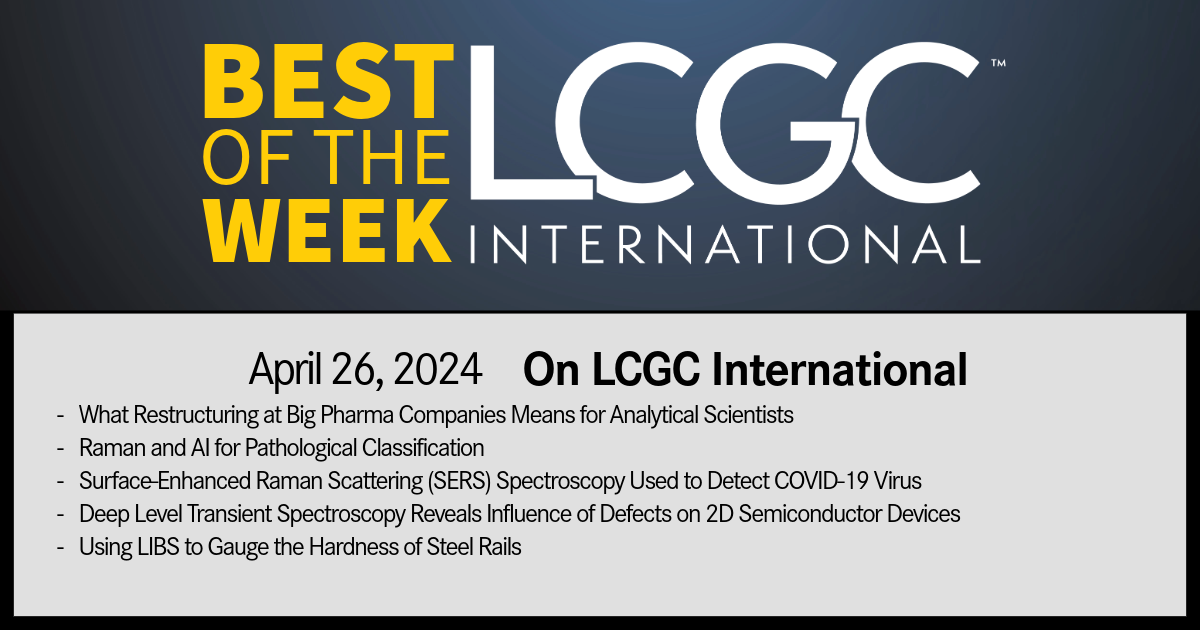Best of the Week: Big Pharma Restructuring, Earth Day, UHPLC, and Smartphones
This week, LCGC International published a variety of articles on the hottest topics in chromatography and beyond. Below, we’ve highlighted some of the most popular articles, according to our readers. Happy reading!

How Restructuring at Big Pharma Companies Impacts Analytical Scientists
Caroline Hroncich
On April 25, 2024, Bristol Meyers Squibb (BMS) announced that it will cut $1.5 billion in costs by the end of 2025, including laying off more than 2000 employees. The announcement comes amid a slew of recent layoffs from Big Pharma compies like Pfizer, Genentech, Sanofi, and GlaxoSmithKline. This could prove worrisome for analytical scientists, who typically look for roles at these companies in lieu of academic laboratories. While analytical scientists are feeling positive about the job market, this sentiment does not come without challenges. Here, we discuss what Big Pharma restructuring could mean for the future of analytical chemistry.
Using UHPLC to Examine Smartphones as a Potential New Matrix for Toxico-Epidemiology
Will Wetzel
Smartphones have become more widespread in modern times, with vast amounts of functionality. Due to constant usage, fingerprints gradually accumulate on the screens of these devices. In a recent study led by Théo Willeman, ultrahigh-pressure liquid chromatography (UHPLC) was used to show that smartphone swab analysis could be useful for testing if drugs were snorted directly from the surface of smartphones.
Traditional Chinese Medicine’s Effects on Liver Cancer Measured Using New UHPLC–QTOF-MS System
Aaron Acevedo
One of the most major types of malignant tumors is primary carcinoma of the liver. The most common type of liver cancer, hepatocellular carcinoma, begins in the main type of liver cells (hepatocytes) and is the third leading cause of cancer-related death worldwide, accounting for 80–90% of primary liver cancers and having a relative five-year survival rate of approximately 18%. However, its complicated onset makes diagnosis and treatment for HCC difficult. In a recent study out of Anhui University of Chinese Medicine in Hefei, China, scientists investigated huachansu tablets, a type of traditional Chinese medicine (TCM) that is effective against liver cancer, to understand its mechanisms.
Chromatography and PFAS Degradation Challenges: An Interview with Katelyn Michael
Patrick Lavery
Katelyn Michael has only recently begun his career, but she has already gained wide recognition across the analytical chemistry industry regarding the mitigation of per- and polyfluoroalkyl substances (PFAS). She was recently announced to be the 2024 recipient of Metrohm’s Young Chemist Award, which is awarded to scientists whose research “transforms the landscape of chemistry.” In this interview, LCGC International talked with Michael, discussing how techniques such as different methods of chromatography and mass spectrometry support her electrochemistry platform for enhancing the degradation of several major PFAS.
Sustainability and Environmental Awareness in the World of Separation Science
Jerome Workman Jr.
This written interview with Dwight Stoll, LCGC Columnist and Professor of Chemistry at Gustavus Adolphus College in St. Peter, Minnesota, addresses the issues of sustainability and environmental awareness in separation. This interview refers to sustainability in the context of the development and utilization of analytical methods and instrumentation that minimize environmental impact, conserve resources, and promote long-term ecological balance while achieving efficient separation and purification of sample molecules.
Silvia Radenkovic on Building Connections in the Scientific Community
April 11th 2025In the second part of our conversation with Silvia Radenkovic, she shares insights into her involvement in scientific organizations and offers advice for young scientists looking to engage more in scientific organizations.
Polysorbate Quantification and Degradation Analysis via LC and Charged Aerosol Detection
April 9th 2025Scientists from ThermoFisher Scientific published a review article in the Journal of Chromatography A that provided an overview of HPLC analysis using charged aerosol detection can help with polysorbate quantification.




